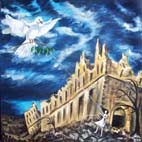 Artist: Kari Lindsay-Beale
Artist: Kari Lindsay-BealeTitle: "Legacy of a Soldier"
Size: 45cm long (necklace) + pendant drop section of 8cm length
Media: Lampworked Glass / Wearable Glass Art
 Artist: Kari Lindsay-Beale
Artist: Kari Lindsay-BealeTitle: "Lest we Forget"
Size: 45cm long (necklace) + pendant drop section of 8cm length
Media: Lampworked Glass / Wearable Glass Art
 Artist: Kari Lindsay-Beale
Artist: Kari Lindsay-BealeTitle: "Fields of the Fallen"
Size: 48cm long (necklace) x 3cm wide at the widest point
Media: Lampworked Glass / Wearable Glass Art
Work by Kari Lindsay-Beale has a strength that belies the fact that it is made of hand-made glass beads. Each of her pieces has a story to tell, beautiful yet sad.
Kari supplied the following information to support her work for the Legato exhibition:
My Grandfather, Major John Henry Beale (called Harry), was born in 1912 in Great Britain. He grew up in an army family, and lived in several countries including Palestine, India and South Africa before leaving his family at the tender age of 16 to sail to New Zealand and set up a life for himself there.
When Britain declared war against Germany in 1939, he enlisted as Private in the New Zealand Army 20th Battalion. He was commissioned as 2nd Lieutenant and embarked for the warzone in the 2nd NZ Expeditionary Force on active service to the Middle East.
In January 1941 he was promoted to Lieutenant and served in Greece, Crete (where he was wounded and much of his division killed), Egypt and Papua New Guinea. He joined the NZEF 11th Reinforcements in January 1944 with the rank of Captain, and was posted to the 26th Battalion in the battle on Cassino, Italy. He was then appointed to the Headquarters of the Allied Armies in Italy from September 1944 to May 1945 where he was raised to the rank of temporary Major.
When the war ended he returned to NZ, was raised officially to Major and served in the Army until he retired from it in 1961.
He was awarded several medals from his time in service, including: The MID Emblem, the 1939-1945 Star, the Africa Star, the Italy Star, the Pacific Star, the Defence Medal, the War Medal 1939-1945, the NZ War Service Medal and the Efficiency Decoration (TF). After retiring from the Army, Harry owned several businesses until his death in September 1999.
At the time of his death he was in the process of writing an historical account of his war-time experiences. This book was not finished in time to be officially published and is a treasured memory now for all of his family. He was a man who always took a keen and active interest in politics and occurences globally. He was a man of dignity, a great conversationalist and a great listener and we his family miss him immensely.
Here is an excerpt from his book titled "The price must be paid":
"The 26th Battalion had once again suffered heavy casualties and had been withdrawn from the line to await reinforcements....We sat on the hill overlooking the Abbey when the massive air attack was launched that demolished the Abbey. Germans refuted the claim that it was used an as observation post and claimed the neutrality of the Abbey had been respected. However when the Abbey was overrun by the Polish Brigade, I entered the Abbey and there were German Machine Gunners dead beside their guns throughout. So even though it was not defended earlier, the Germans had certainly taken advantage of the rubble and in the final stages of the battle used the Abbey for observation and siting gun positions....(pg.78 & 79 of 'The price must be paid' by Major John Henry Beale)
Now that Cassino had been captured, and the landings of Allied troops at Anzio had consolidated and moved inwards, the Highway 6 to Rome reopened. We moved north again liberating Italian villages as we went. It was a period of great relaxation, with Vino flowing and much celebration from the liberated villages. It was a great change to be part of a victorious army, where seldom was a German plane seen. What a turnaround from the early days of Greece when the skies were full of the enemy. I started to feel that the end of the war was in sight but there were still some hard battles to be fought."
My Grandfather found it difficult to speak of the devastating effects that the war had on him - he lost many good friends there and in order to cope he had to block many of these emotions. He always preferred to speak primarily of the tactical moves and the events in history that were involved at the time, but he did shed tears with us on occasion.
He found great solace and comfort in Psalm 23 and the Hymn "I vow to thee, my country":
"I vow to thee my country - all earthly things above
Entire and whole and perfect, the service of my love,
The love that asks no question: the love that stands the test,
That lays upon the altar the dearest and the best.
The love that never falters, the love that pays the price,
The love that makes undaunted the final sacrifice.
And then there's another country, I've heard of long ago
Most dear to them that love her, most great to them that know
We may not count her armies: we may not see her king
Her fortress is a faithful heart, her pride is suffering
And soul by soul and silently her shining bounds increase,
And her ways are ways of gentleness and all her paths are peace."












No comments:
Post a Comment